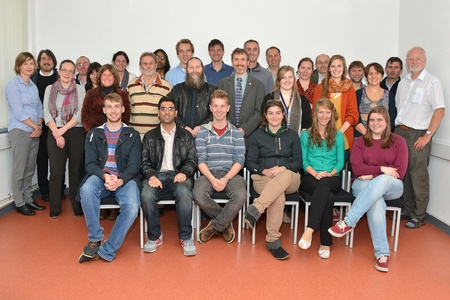Environmental change, sustainable natural resource management and food security are just some of the themes new PhD students at the University of Aberdeen will be hoping to address.
The University’s Environment and Food Security Theme has set-up several studentship schemes including joint PhD awards with the University of Western Sydney, studentships with the James Hutton Institute and the University of Dundee as part of the Scottish Food Security Alliance – Crops, studentships within the Marine Collaboration Research Forum (MarCRF) with Marine Scotland Science, as well as studentships core funded through the Theme.
Today six interdisciplinary PhD students are welcomed to the University to start the Theme’s ambitious task of developing and adopting sustainable solutions to crucial societal issues.
Students will draw on cross-disciplinary expertise from our three Colleges (Life Sciences and Medicine, Physical Sciences, and Arts and Social Sciences), as well as external collaborators such as the James Hutton Institute, to bring a fresh perspective and a robust, evidence-based framework to guide government and other decision making bodies in tackling the global scale challenges.
Students will work on developing tools for citizen science, environmentally sustainable diets and sustainable energy extraction, among other topics.
Also being welcomed to the University today are five MarCRF research students (MRes and PhD) focussing on marine science. MarCRF aims to understand how climate change and new uses such as large scale offshore renewable developments, marine protected areas and the fish discard ban will affect the marine environment in order to facilitate a proactive approach to the evolution of effective policies.
Current projects range from issues of disease limitation and multi-trophic approaches to improving our Aquaculture Industry, to understanding the spatial diversity of our zooplankton species and finding out ‘who ate all the hake’ as well as designing both the tools and the evidence based framework for marine spatial planning.
Professor Sir Ian Diamond, University of Aberdeen Principal said: “Research students are an essential component of our research success and our vibrant community. I warmly welcome this new cohort of students to our University. They are an integral component of our strengthened collaborations with our local partners, the James Hutton Institute and Marine Scotland Science, with whom we are well positioned to tackle the global issues of environmental sustainability and food security.”
Professor Pete Smith, Environment and Food Security Lead, said: “We are pleased to welcome this cohort of six PhD students under the Environment and Food Security Theme, and the additional appointments through MarCRF.
“The students will together be tackling some of the most challenging problems facing humanity in the coming decades, and will contribute to delivering the aims of the EFS Theme. The students bring together truly cross-disciplinary teams of supervisors from across the University and from our partner organisations. We have great strengths in different Colleges, and these studentships will initiate new and long-lasting collaborations.”
Professor Colin Moffat, the Head of Science at Marine Scotland said: “I am particularly excited by this initiative because it spans the various science training levels. Our seas are fundamental to Scotland and yet we still have a lot to learn about how they function and how human activities, both individually and cumulatively, affect this part of our natural environment. We have worked closely with the University of Aberdeen for many years but this takes the collaboration to a new level and brings new blood to Aberdeen which should ensure a strong marine science base in the City for many years to come.”


